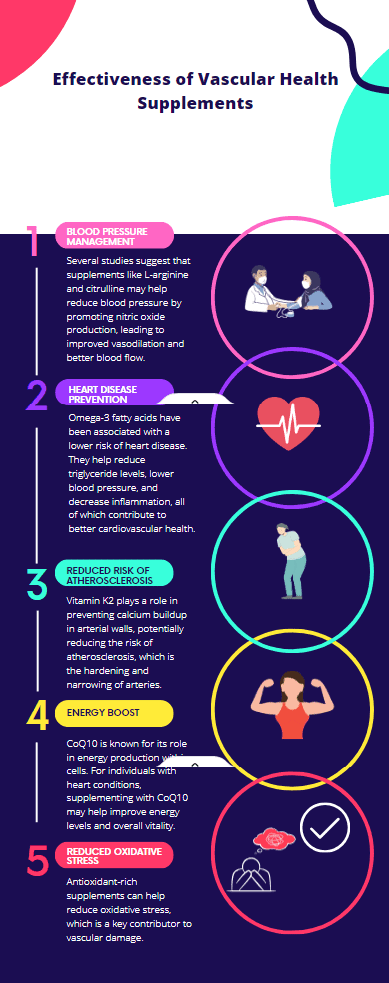In today’s fast-paced world, maintaining good health is a top priority for many. One crucial aspect of overall health is vascular health, as the proper functioning of our circulatory system is vital for maintaining overall well-being. Vascular health supplements have gained popularity in recent years as a potential means to support and improve cardiovascular health. In this blog post, we will explore the science behind vascular health supplements, their safety, and their effectiveness. By the end, you’ll have a better understanding of these supplements and how they can positively impact your circulatory wellness.
Understanding Vascular Health Supplements
Vascular health supplements are dietary products designed to support the cardiovascular system. They often contain a mix of vitamins, minerals, antioxidants, and other bioactive compounds known to promote vascular health. These supplements are formulated with the intent of improving blood flow, reducing inflammation, and protecting blood vessels from damage. Let’s delve into the science behind these supplements to better understand how they work.
The Science Behind Vascular Health Supplements
- Antioxidants and Inflammation: Many vascular health supplements contain antioxidants such as vitamin C, vitamin E, and polyphenols. These antioxidants play a crucial role in reducing oxidative stress and inflammation in blood vessels. Oxidative stress and chronic inflammation are key contributors to vascular damage and the development of cardiovascular diseases.
- Nitric Oxide Production: Nitric oxide (NO) is a molecule that relaxes and dilates blood vessels, promoting healthy blood flow. Some vascular health supplements, like L-arginine and citrulline, can boost NO production, which may help improve circulation and lower blood pressure.
- Omega-3 Fatty Acids: Omega-3 fatty acids found in fish oil supplements have been extensively studied for their cardiovascular benefits. They can reduce triglyceride levels, lower blood pressure, and decrease inflammation, all of which contribute to better vascular health.
- Coenzyme Q10 (CoQ10): CoQ10 is a compound that plays a vital role in cellular energy production. It also acts as an antioxidant and has been shown to support heart health by improving blood vessel function and reducing oxidative stress.
- Vitamin K2: Vitamin K2 plays a role in regulating calcium in the body, preventing calcium buildup in arterial walls, which can lead to arterial stiffness and calcification. By ensuring proper calcium distribution, vitamin K2 helps maintain vascular health.
The Safety of Vascular Health Supplements
Ensuring the safety of any dietary supplement is of paramount importance. Vascular health supplements, when used appropriately, are generally safe for most individuals. However, it’s essential to follow recommended dosages and consult with a healthcare provider before starting any supplement regimen, especially if you have underlying health conditions or are taking medications.
Potential risks associated with vascular health supplements can include:
- Interactions with Medications: Some supplements may interact with medications you’re currently taking. For example, vitamin K supplements may interfere with blood-thinning medications. Always consult with your healthcare provider to avoid potential conflicts.
- Allergic Reactions: Individuals with allergies or sensitivities to specific ingredients in supplements should be cautious. Read labels carefully and choose products that don’t contain allergens you react to.
- Overdose Risk: Taking excessive amounts of certain vitamins or minerals can lead to toxicity. It’s crucial to stick to recommended dosages and avoid “mega-dosing” unless directed by a healthcare professional.
- Quality and Purity: Ensure you purchase supplements from reputable brands that undergo third-party testing to verify the quality and purity of their products.
Effectiveness of Vascular Health Supplements
Now that we’ve covered the safety aspect, let’s explore the effectiveness of vascular health supplements. It’s essential to understand that these supplements are not a magic cure-all, but they can be a valuable addition to a holistic approach to cardiovascular wellness.

- Blood Pressure Management: Several studies suggest that supplements like L-arginine and citrulline may help reduce blood pressure by promoting nitric oxide production, leading to improved vasodilation and better blood flow.
- Heart Disease Prevention: Omega-3 fatty acids have been associated with a lower risk of heart disease. They help reduce triglyceride levels, lower blood pressure, and decrease inflammation, all of which contribute to better cardiovascular health.
- Reduced Risk of Atherosclerosis: Vitamin K2 plays a role in preventing calcium buildup in arterial walls, potentially reducing the risk of atherosclerosis, which is the hardening and narrowing of arteries.
- Energy Boost: CoQ10 is known for its role in energy production within cells. For individuals with heart conditions, supplementing with CoQ10 may help improve energy levels and overall vitality.
- Reduced Oxidative Stress: Antioxidant-rich supplements can help reduce oxidative stress, which is a key contributor to vascular damage. Lowering oxidative stress can support overall vascular health.
Frequently Asked Questions
1. Are vascular health supplements a substitute for a healthy diet and lifestyle?
No, vascular health supplements should not replace a balanced diet and a healthy lifestyle. They can complement these factors by providing additional nutrients and compounds that support cardiovascular health. However, maintaining a nutritious diet, regular exercise, and managing stress are crucial components of a comprehensive approach to vascular health.
2. Can I take multiple vascular health supplements together?
It’s generally safe to take multiple vascular health supplements together, as long as you stay within recommended dosages. However, it’s best to consult with a healthcare provider or a nutritionist to ensure that the combination is appropriate for your specific needs and health status.
3. How long does it take to see results from vascular health supplements?
The timeline for experiencing the benefits of vascular health supplements can vary from person to person. Some individuals may notice improvements in a few weeks, while others may require several months of consistent use. The key is to be patient and continue taking the supplements as directed while maintaining a healthy lifestyle.
4. Are there any side effects associated with vascular health supplements?
Side effects are possible, depending on the specific supplements and individual factors. Common side effects may include digestive issues, mild allergic reactions, or interactions with medications. To minimize the risk of side effects, follow recommended dosages and consult with a healthcare provider before starting any new supplement.
5. Are there age restrictions for using vascular health supplements?
Vascular health supplements are generally safe for adults of all ages. However, the specific supplements and dosages may vary based on individual needs and health goals. It’s advisable to consult with a healthcare provider, especially for children, pregnant or breastfeeding women, and older adults, to determine the most suitable supplements and dosages.
Conclusion
Vascular health supplements can be valuable tools for promoting cardiovascular well-being when used responsibly and in conjunction with a healthy lifestyle. The science behind these supplements highlights their potential to improve blood flow, reduce inflammation, and protect blood vessels from damage. However, they should not be seen as a replacement for a balanced diet, regular exercise, and stress management. As with any supplement, it’s essential to prioritize safety by consulting with a healthcare provider and following recommended dosages. By making informed choices, you can take proactive steps to support your vascular health and overall well-being.

